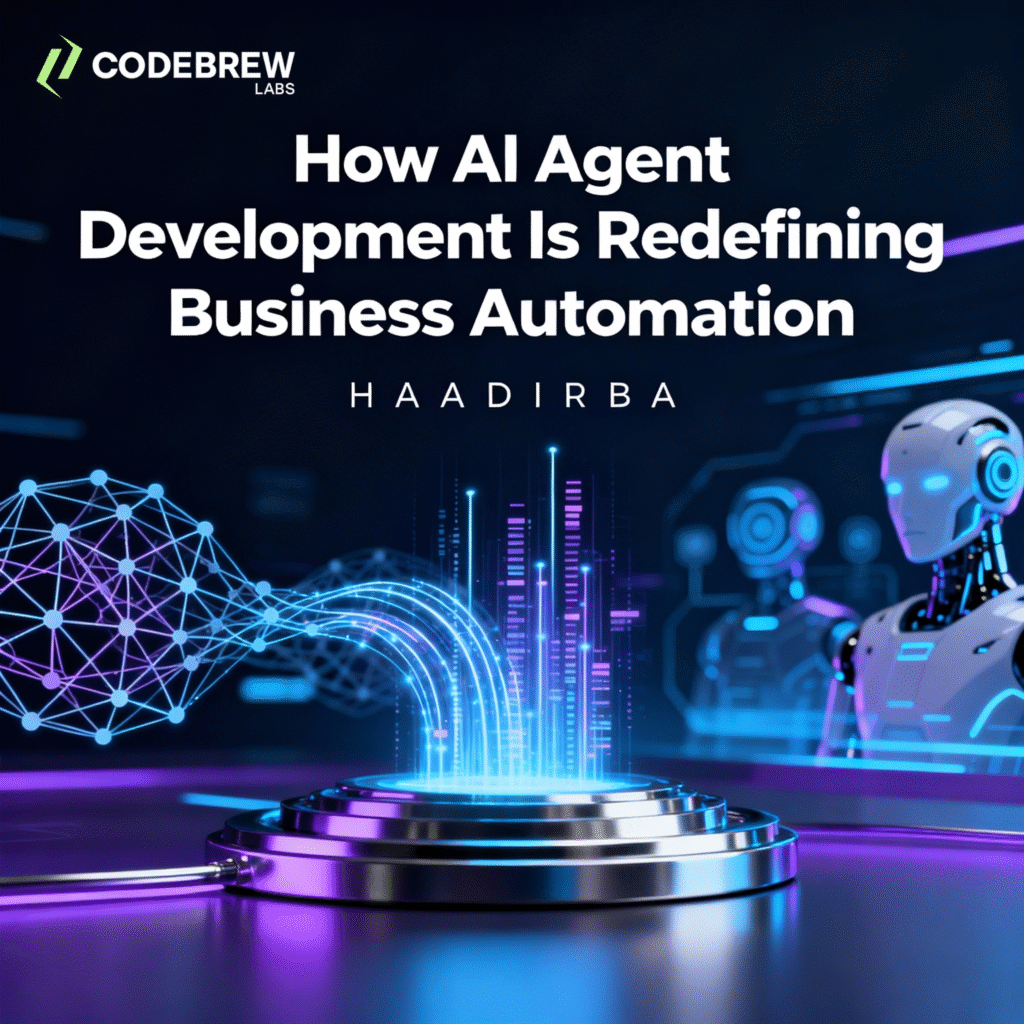
Introduction to AI Agent Development
What Are AI Agents?
AI agents are intelligent digital systems capable of perceiving their environment, processing information, and taking autonomous actions to achieve specific goals. Unlike traditional automation tools that follow fixed rules, AI agents can learn from data, adapt to new circumstances, and make decisions independently.
Think of AI agent development as the next evolution of digital workers; they don’t just perform tasks; they understand why they’re doing them. They can analyze data, predict outcomes, and execute solutions without needing constant human intervention.
From intelligent chatbots that provide 24/7 customer support to predictive systems that forecast inventory needs, AI agents operate with human-like reasoning while offering machine-level efficiency. They’re powered by technologies like machine learning (ML), natural language processing (NLP), and robotic process automation (RPA), which together enable advanced problem-solving capabilities.
In essence, AI agents combine cognitive intelligence with process automation, making them invaluable assets for modern enterprises striving for efficiency, precision, and innovation.
Evolution of AI Agents in the Modern Business Landscape
The concept of AI agents has evolved dramatically over the past few decades. Initially, automation focused on simple rule-based tasks; systems could only perform actions when a predefined condition was met. These were useful for basic workflows but lacked flexibility and contextual understanding.
However, as artificial intelligence and machine learning technologies advanced, automation systems became more intelligent. The 2010s marked a turning point with the emergence of predictive algorithms and self-learning systems. Businesses began to see the potential of AI agents that could analyze data, understand human language, and make dynamic decisions.
Today, AI agents are integral to the digital transformation journey across industries. From autonomous customer service agents that respond to real-time inquiries to AI-driven sales assistants that personalize recommendations, these systems are revolutionizing the way organizations operate.
The next frontier is the rise of Generative AI and Conversational AI, which empower AI agents to not only respond intelligently but also create content, design workflows, and generate innovative business solutions. Companies investing in this evolution are experiencing higher efficiency, better customer engagement, and exponential growth.
Key Technologies Powering AI Agents (NLP, ML, RPA, etc.)
The power of AI agents comes from the seamless integration of multiple technologies working together. Let’s explore the key ones driving this revolution:
- Machine Learning (ML): ML algorithms enable AI agents to learn from historical data and improve their performance over time. By recognizing patterns, they can predict outcomes, automate decision-making, and continuously optimize operations.
- Natural Language Processing (NLP): NLP allows AI agents to understand and communicate using human language. This technology powers chatbots, virtual assistants, and sentiment analysis tools that make interactions more intuitive and human-like.
- Robotic Process Automation (RPA): RPA automates repetitive tasks like data entry, invoicing, and report generation. When integrated with AI, RPA becomes “intelligent automation,” capable of handling complex processes that involve reasoning and decision-making.
- Deep Learning and Neural Networks: Deep learning models mimic how the human brain processes information, enabling AI agents to recognize images, speech, and emotions with exceptional accuracy.
- Predictive Analytics: This enables AI agents to forecast trends, customer behavior, and operational risks. Businesses use it for inventory optimization, fraud detection, and demand forecasting.
- Generative AI: Generative AI technologies like GPT, Claude, and Gemini allow AI agents to generate new text, images, or code, making them ideal for content creation, product design, and marketing automation.
Together, these technologies enable AI agents to function intelligently, providing organizations with smarter, faster, and more scalable automation solutions.
The Role of AI Agents in Business Automation
How AI Agents Simplify Complex Business Processes
AI agents are redefining the automation landscape by simplifying tasks that were once too complex for traditional software. Instead of requiring humans to manually oversee every process, AI agents analyze data, make real-time decisions, and optimize workflows with minimal supervision.
For example, in logistics, AI agents can track shipments, predict delays, and reroute deliveries automatically. In finance, they can detect fraudulent transactions by analyzing thousands of data points in milliseconds.
What sets AI agents apart is their ability to handle unstructured data, such as emails, chat logs, voice notes, and documents, and convert it into actionable insights. This makes them ideal for industries that rely heavily on customer communication and real-time decision-making.
The result? Smarter workflows, reduced human error, and massive time savings. Instead of spending hours processing data or approving transactions, businesses can rely on AI agents to perform these tasks autonomously while employees focus on strategic innovation.
Real-World Examples of AI-Powered Automation
AI-powered automation is already transforming industries globally. Here are a few standout examples:
- Customer Support: AI chatbots handle up to 80% of customer queries instantly, freeing human agents to focus on complex issues. Companies like Amazon and Shopify use AI assistants to manage customer service around the clock.
- Finance: Banks use AI agents to monitor transactions and detect fraud. Machine learning models identify unusual spending patterns faster than any manual system.
- Healthcare: AI-driven diagnostic tools analyze X-rays and MRI scans with accuracy rates surpassing human experts. Virtual health agents schedule appointments and provide medical guidance.
- E-commerce: Recommendation engines powered by AI agents personalize product suggestions, driving higher conversion rates and customer loyalty.
- Manufacturing: Predictive maintenance agents analyze sensor data to detect potential equipment failures before they occur, saving companies millions in downtime costs.
These examples highlight that AI-powered automation is not a futuristic dream—it’s a present-day reality transforming operations, improving accuracy, and boosting business performance across the board.
Benefits of Implementing AI Agents in Daily Operations
Implementing AI agents into business workflows delivers numerous benefits that go beyond efficiency. Here’s how they revolutionize daily operations:
- 24/7 Availability: AI agents work around the clock without fatigue, ensuring consistent performance and faster response times.
- Increased Productivity: By automating repetitive tasks, businesses can reallocate human resources to creative and strategic roles.
- Error Reduction: AI systems minimize human mistakes, ensuring accuracy in data-driven tasks such as accounting, inventory management, and reporting.
- Cost Efficiency: AI automation reduces operational expenses by cutting manual labor and optimizing processes.
- Data-Driven Insights: AI agents continuously analyze large datasets, uncovering patterns that support smarter business decisions.
- Personalized Experiences: AI can tailor interactions for customers, offering recommendations and services based on preferences and behaviors.
- Scalability: Whether managing 100 or 1 million transactions, AI agents can scale effortlessly without increasing costs.
By implementing AI agents, organizations not only streamline operations but also foster a culture of innovation and agility, key drivers of success in the digital era.
Industries Revolutionized by AI Agent Development
AI in Customer Support and Service Automation
Customer service has seen one of the most profound transformations due to AI agent integration. Intelligent virtual assistants and chatbots now manage millions of interactions daily, handling inquiries, complaints, and service requests with near-human empathy.
AI-powered systems can understand customer emotions, predict needs, and provide personalized solutions in seconds. For example, AI support agents use NLP to analyze the tone of a customer’s message and adjust their responses accordingly, turning frustrating interactions into positive experiences.
This evolution not only enhances customer satisfaction but also reduces operational costs by up to 40%, as businesses require fewer human agents for repetitive support tasks. Moreover, customers benefit from faster resolutions and consistent service quality anytime, anywhere.
AI in Sales, Marketing, and CRM
AI agents are revolutionizing sales and marketing by making data-driven decisions faster than ever before. In marketing, they analyze customer behavior, segment audiences, and create personalized campaigns that increase conversion rates.
In sales, AI-driven CRM systems automatically prioritize leads, predict buying intent, and recommend the next best actions for sales teams. This means less guesswork and more accurate forecasting.
Generative AI tools further enhance marketing creativity by producing social media content, ad copies, and personalized emails—tailored for each audience segment. As a result, businesses enjoy higher engagement rates and improved ROI from every marketing dollar spent.
AI in Healthcare, Finance, and Logistics
AI agents are revolutionizing critical sectors like healthcare, finance, and logistics by introducing precision, efficiency, and reliability.
In healthcare, AI agents assist doctors with diagnostics by analyzing medical records and images with accuracy levels that often exceed human capability. Virtual health assistants manage patient scheduling, reminders, and telehealth consultations.
In finance, AI agents perform risk analysis, fraud detection, and investment forecasting. They assess creditworthiness, identify fraudulent activity, and automate loan processing with exceptional accuracy.
In logistics, AI-powered systems optimize routes, predict delivery times, and manage fleet performance. This reduces fuel costs, minimizes delays, and ensures smooth global supply chain operations.
Across these industries, AI agents are driving digital transformation by delivering smarter decision-making, operational resilience, and better outcomes for customers and businesses alike.
Key Features of Intelligent Business Automation with AI
Predictive Analytics and Decision-Making
Predictive analytics is one of the most powerful features of AI-driven automation. It enables businesses to anticipate customer needs, forecast sales, and optimize resource allocation. AI agents process vast datasets in real-time, identifying patterns that humans might overlook.
For instance, retailers can predict which products will be in demand next month, while manufacturers can forecast equipment failures. This foresight allows companies to stay ahead of competitors and reduce unnecessary costs.
Personalized Customer Experiences
AI agents analyze user behavior and preferences to deliver hyper-personalized experiences. In e-commerce, they recommend products based on past purchases; in banking, they tailor financial advice to customers’ spending habits.
This personalized approach not only enhances customer satisfaction but also boosts brand loyalty and conversion rates. Businesses leveraging AI personalization see, on average, a 20–30% increase in customer retention.
Data Management and Process Optimization
AI agents excel at managing vast amounts of data, collecting, cleaning, and organizing information for seamless operations. They identify inefficiencies in workflows and suggest optimization strategies automatically.
By implementing AI-driven process optimization, organizations can reduce operational costs, minimize delays, and enhance productivity across departments. This level of automation ensures that every decision and process is based on accurate, real-time data.
How AI Agents Integrate with Existing Business Systems
Integration with ERP, CRM, and HR Tools
One of the biggest advantages of AI agents is their ability to integrate seamlessly with existing business systems such as Enterprise Resource Planning (ERP), Customer Relationship Management (CRM), and Human Resource (HR) platforms.
This integration ensures data flows smoothly between departments, eliminating silos and improving collaboration. For instance, an AI agent can extract data from a CRM system to personalize customer interactions or update ERP records automatically after each transaction.
Workflow Automation and API Connectivity
AI agents utilize Application Programming Interfaces (APIs) to connect disparate systems and automate workflows end-to-end. This enables real-time synchronization between software platforms, ensuring accurate data sharing and process consistency.
Through workflow automation, businesses can reduce manual effort, minimize human error, and speed up turnaround times. Whether it’s automating invoice approvals or synchronizing marketing campaigns, API-driven AI agents enhance overall business efficiency.
Security and Compliance Considerations
Security and compliance are critical in AI integration. AI agents handle sensitive data, making encryption, user authentication, and data governance essential.
We design AI systems with built-in compliance protocols for standards like GDPR and HIPAA. Regular audits, access controls, and continuous monitoring ensure all automated processes remain safe, transparent, and trustworthy.
How We Help in Building an AI-Powered App
Our AI App Development Process (Step-by-Step Overview)
Creating a successful AI-powered app requires a clear, strategic approach from ideation to deployment and beyond. Our proven step-by-step process ensures that every project we undertake is aligned with your business goals, technologically sound, and capable of delivering measurable results.
Here’s how we bring your AI vision to life:
- Discovery and Consultation: We begin with a deep dive into your business objectives, target audience, and operational challenges. Our experts assess where AI can make the most impact, whether in automation, customer engagement, analytics, or process optimization.
- Feasibility Analysis and Planning: Once we understand your goals, we conduct a detailed feasibility study. This involves identifying data sources, evaluating technical requirements, and selecting the best AI models for your project. The outcome is a strategic roadmap outlining deliverables, timelines, and costs.
- Data Collection and Preparation: Data is the foundation of AI. We collect, clean, and structure datasets to ensure accuracy and reliability. This step may include integrating third-party APIs, using synthetic data, or developing secure data pipelines.
- AI Model Development and Training: Our data scientists and engineers design, train, and fine-tune machine learning models to achieve optimal performance. Depending on your app’s needs, we use supervised, unsupervised, or deep learning techniques to enable intelligent decision-making.
- Integration with Your Systems: Once the AI model is ready, we seamlessly integrate it into your existing infrastructure, whether it’s a mobile app, web platform, or enterprise software. This ensures smooth communication between the AI components and your business systems.
- Testing and Optimization: We rigorously test every aspect of the AI app, from functionality and scalability to performance and accuracy. Our QA specialists conduct user testing to ensure that the app delivers consistent, high-quality outcomes in real-world scenarios.
- Deployment and Support: After successful testing, we deploy the app securely to your chosen environment on-premises or in the cloud. But our partnership doesn’t end there. We offer continuous maintenance, retraining, and performance monitoring to ensure your AI solution evolves with your business.
Our process is designed to be collaborative, transparent, and agile, giving you complete visibility and control at every stage of development.
Technologies and Frameworks We Use (Python, TensorFlow, GPT APIs, etc.)
Building robust and scalable AI applications requires the right combination of tools, frameworks, and programming languages. Our team leverages industry-leading technologies to create AI agents that are efficient, adaptable, and future-proof.
Here’s an overview of the tech stack we use:
- Programming Languages:
- Python: The backbone of AI development, used for machine learning, NLP, and automation.
- JavaScript & Node.js: Ideal for backend integration and web-based AI apps.
- R: Perfect for statistical computing and predictive analytics.
- AI and Machine Learning Frameworks:
- TensorFlow & PyTorch: Used for deep learning model development and neural network training.
- Scikit-Learn: For predictive modeling, data analysis, and ML algorithms.
- Keras: Simplifies the creation and training of deep learning models.
- Natural Language Processing (NLP) Tools:
- OpenAI GPT APIs: For natural language understanding, conversation automation, and generative tasks.
- spaCy & NLTK: Used for text processing and linguistic analysis.
- Automation & Integration Tools:
- RPA Platforms (UiPath, Automation Anywhere): For intelligent process automation.
- API Frameworks: For smooth integration between business systems like ERP, CRM, and HR software.
- Cloud and Data Infrastructure:
- AWS AI/ML Services, Google Cloud AI, and Microsoft Azure AI for scalable cloud-based deployment.
- MongoDB, PostgreSQL, and Elasticsearch for data storage and retrieval.
By combining these powerful tools, we deliver AI solutions that are efficient, secure, and highly customizable, ensuring they can adapt to your business’s evolving needs.
Customization and Scalability for Every Business Size
Every business is unique, and so should be its AI solutions. We specialize in building custom AI applications that align perfectly with your company’s goals, processes, and scale.
For startups, we focus on lean, cost-effective solutions that deliver maximum impact with minimal infrastructure. For growing businesses, we create scalable systems capable of handling expanding data volumes and user demands. For enterprises, we design advanced AI ecosystems that integrate seamlessly across multiple departments and operations.
Our development model allows for modular customization, meaning you can start small with essential features and later expand your AI app with predictive analytics, generative AI, or workflow automation as your business evolves.
Scalability is baked into every stage of development, from cloud architecture to model training pipelines, ensuring your AI solution grows with you without performance degradation.
With our end-to-end support and adaptive development strategies, businesses of all sizes can confidently harness the full potential of AI automation.
How Much Does It Cost to Create an AI App?
Factors Affecting the Cost of AI App Development
The cost of developing an AI-powered app depends on various elements, including complexity, data needs, and the technologies used. Here’s what typically influences the pricing:
- Complexity and Features: The more complex your app (e.g., predictive analytics, computer vision, voice recognition), the higher the development cost.
- Data Requirements: Data collection, cleaning, and annotation contribute significantly to total expenses.
- Integration Needs: Integration with CRMs, ERPs, or third-party APIs adds to development time and cost.
- AI Model Type: Custom models trained from scratch cost more than fine-tuning pre-trained models like GPT or BERT.
- UI/UX Design and Testing: A polished interface and rigorous QA testing are essential for a seamless user experience.
- Ongoing Maintenance: Continuous updates, retraining, and support ensure your AI stays efficient and compliant.
Starting Price and Typical Pricing Ranges (Starting from $5,000)
Our AI app development services start from $5,000, making them accessible to both startups and enterprises. Here’s a general cost breakdown based on project type:
AI App Type Complexity Estimated Cost (USD)Timeframe
Basic AI Chatbot / Automation Tool: Low $5,000 – $10,000 4–6 weeks
NLP-Based Virtual Assistant: Medium $5,000 – $25,000 6–10 weeks
Predictive Analytics or Recommendation Engine: Medium–High $5,000 – $40,000 8–12 weeks
Custom Deep Learning / Generative AI App: High $5,000 – $100,000+ 12–20 weeks
We tailor our pricing to suit your goals, budget, and long-term growth strategy.
Cost vs. ROI Analysis – Why It’s Worth the Investment
Although AI development requires an upfront investment, the return on investment (ROI) is substantial. Here’s why:
- Operational Efficiency: Reduces repetitive work and human error, saving up to 50% in operational costs.
- Revenue Growth: AI personalization increases customer engagement, driving higher sales.
- Better Decision-Making: Real-time analytics empower data-driven strategies.
- Scalability: Once deployed, AI systems handle increased workloads at minimal additional cost.
- Long-Term Value: As AI agents learn and evolve, their efficiency improves over time, increasing returns exponentially.
Investing in AI isn’t an expense; it’s a long-term growth strategy that pays for itself through improved performance and productivity.
Challenges in AI Agent Development and How We Overcome Them
Data Quality and Availability Issues
AI systems rely on high-quality, structured data. We address data challenges through data cleansing, normalization, and enrichment to ensure accuracy and reliability.
Ethical AI and Data Privacy Concerns
We integrate ethical frameworks and compliance protocols (GDPR, HIPAA) into every project, ensuring AI systems are transparent, unbiased, and secure.
Continuous Learning and Maintenance
AI models evolve. Our MLOps approach ensures regular retraining, monitoring, and optimization, so your AI agents stay sharp and aligned with business needs.
Why Choose Us for AI Agent Development
Experienced AI Engineers and Strategists
Our multidisciplinary team of AI experts, data scientists, and engineers brings years of experience delivering custom automation and AI solutions across industries.
Transparent Pricing and Agile Development
We follow an Agile methodology with milestone-based transparency. You know exactly what you’re paying for, with no hidden costs.
Proven Success Stories and Client Testimonials
Our clients have achieved measurable success ranging from 30% cost savings to 50% productivity boosts thanks to our tailored AI solutions.
The Future of Business Automation with AI Agents
Emerging Trends in Autonomous Systems
AI is evolving toward self-governing systems capable of independent decision-making, driving the next wave of business efficiency.
The Rise of Generative AI and Intelligent Virtual Agents
Generative AI models (like GPT) are empowering intelligent virtual agents that create, converse, and collaborate like humans.
Long-Term Business Growth through AI Transformation
Businesses that adopt AI today are future-proofing their operations for the next decade. AI is not just an advantage; it’s becoming a necessity for survival in the digital economy.
Conclusion
Recap of AI’s Transformative Role in Automation
AI agent development has fundamentally changed how businesses operate, ushering in an age of intelligent, data-driven automation. From streamlining daily operations to predicting future trends, AI is redefining efficiency and productivity.
Today’s businesses can leverage AI to enhance decision-making, improve customer engagement, and drive innovation at every level. The impact of AI agents extends far beyond cost savings; it’s about creating smarter, faster, and more responsive organizations.
Why Now Is the Best Time to Invest in AI Development
With advancements in machine learning, NLP, and generative AI, there’s never been a better time to invest in automation. Businesses that adopt AI now will not only gain a competitive edge but also future-proof their operations against evolving market challenges.
Whether you’re a startup or an enterprise, implementing AI agents today ensures your organization remains agile, efficient, and ready for the future.
FAQs
1. What is the main difference between AI agents and traditional automation?
Traditional automation follows predefined rules, while AI agents learn, adapt, and make intelligent decisions based on data. This makes AI automation far more flexible and scalable.
2. How long does it take to develop an AI-powered app?
The development timeline varies depending on complexity and features, but typically ranges from 6 to 12 weeks for most business applications.
3. Can small businesses afford AI automation?
Absolutely. With modular development and scalable solutions starting at $5,000, even small businesses can leverage AI to improve efficiency and growth.
4. What kind of businesses benefit most from AI agent development?
AI agents are beneficial across industries, including retail, healthcare, finance, logistics, marketing, and customer service, essentially any business with repetitive or data-driven tasks.
5. How can I get started with your AI app development services?
You can begin by scheduling a free consultation with our AI development team. We’ll discuss your business needs, propose a custom AI solution, and provide a transparent cost estimate.





